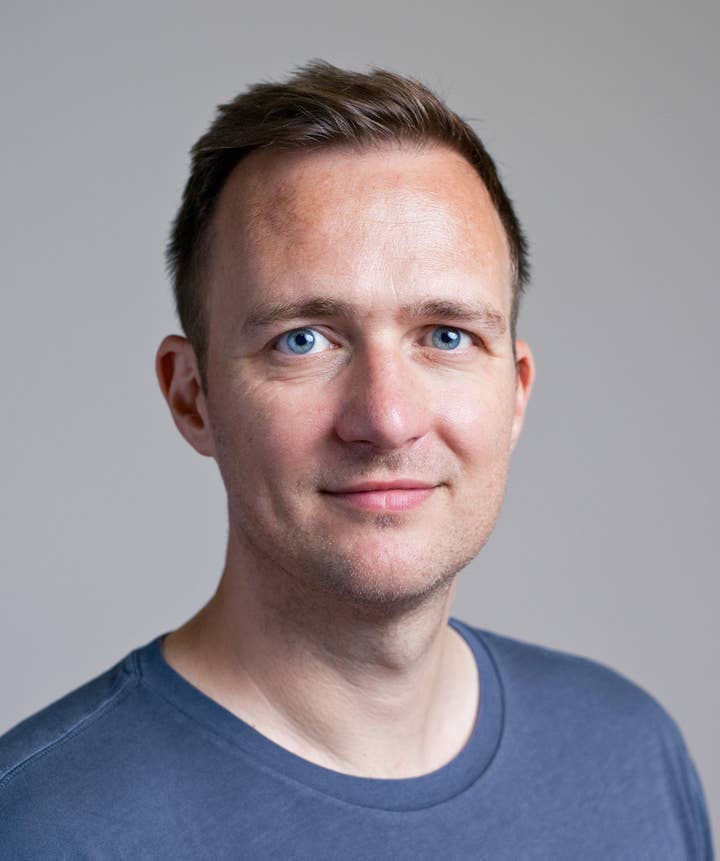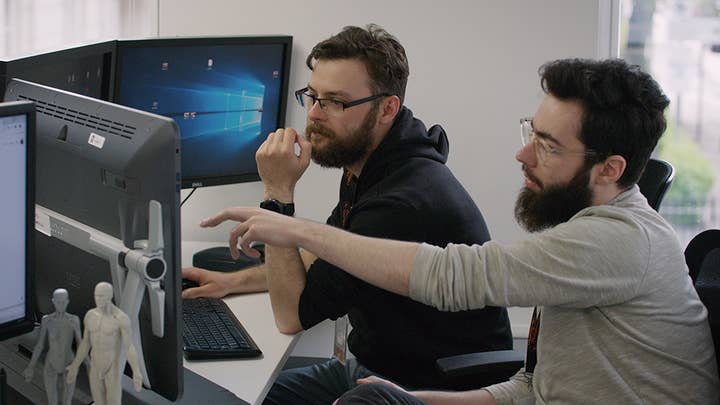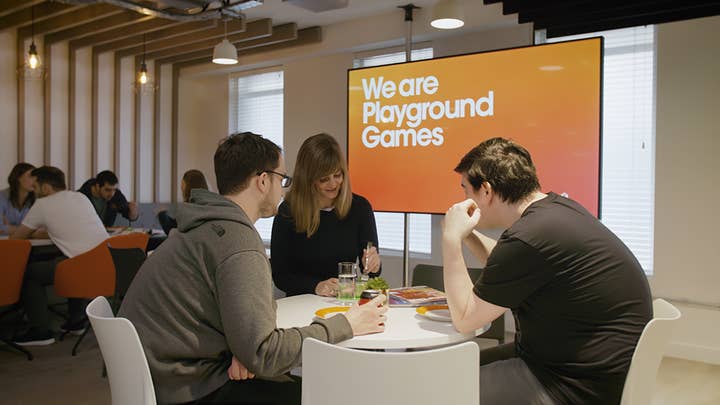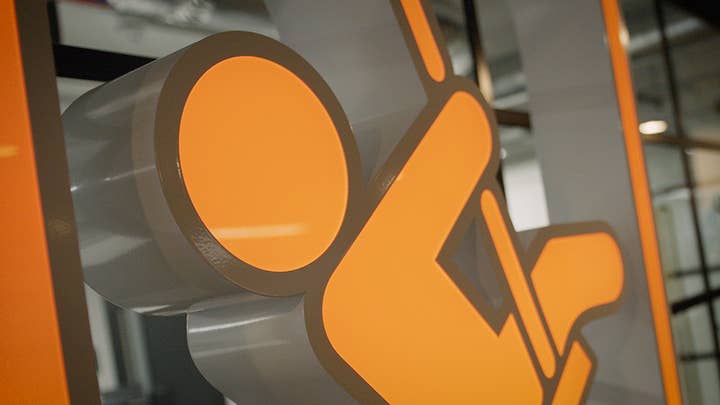Playground Games: "Crunch has no place in modern development"
The Forza Horizon developer on its new studio, and the transition to running a game as a live service
Playground Games is rather busy. The Leamington-based developer is hard at work on an unannounced action-RPG (widely rumoured to be a revival of the Fable franchise), it's still recruiting for the second studio dedicated to this project, and work has inevitably begun on the next entry in its best-selling Forza Horizon series.
But on top of all that, the Playground team has a new challenge: running Forza Horizon 4 as a live service. Since its launch last October, the widely praised racing game has received updates and expansions every four weeks, as well as bug fixes and quality of life improvements to smooth things out for its vast online community.
While other studios have developed years of experience in servicing a live game, this is still largely uncharted territory for Playground. On our recent visit to the secretive second studio, founder and creative director Ralph Fulton praised his team for rising to that challenge.
"It's just learning a different rhythm of working for the team, and learning to balance competing priorities in a much shorter time frame than you ever do when you develop a game over two or more years," he said.

"And you can totally see the impact of that on the game as it is now, which I think is really different from the game we shipped. There's tons more content in it, we've made big changes to the online game, and that's all because of that live service program; having a live team who are dedicated to improving and expanding the game, and keeping a constant dialogue with the fans."
But with updates every four weeks (to match the rotation between seasons in the game), surely that live service team is in danger of constant crunch? Even the mighty Epic Games is reportedly putting its staff through intensive working conditions to meet the appetite of Fortnite players.
"Crunch for us is something we work very hard to remove completely," studio director Gavin Raeburn told GamesIndustry.biz. "It's not something we see as having a place in modern development, and we work very hard to minimise it or remove it completely. With the live service, our policy on that is, if we're heading towards a milestone and work cannot be completed in time, we will move it to the next milestone rather than crunch the team to meet that [deadline]."
Fulton reiterates that the live service team is dedicated solely to updating Forza Horizon 4, which avoids diverting resources from the inevitable sequel or its unannounced project. Far from management pressuring them to maintain the pace of additions to the game, conversations between Fulton and the live team suggest that the biggest pressure comes from the community.
"Crunch is something we work very hard to remove completely. It's not something we see as having a place in modern development"
Gavin Raeburn, Playground Games
"They feel like they have to do it, like there's outcry for this particular thing, or on occasions something we've already said we'd fix," he said. "As an example, wall riding was an issue in our online game, we said we'd fix it but we didn't have the perfect solution -- [the team] felt a real pressure to deliver for the fans. But we've been quite clear with them that, because the live service could theoretically run forever, crunch cannot be an option... And they've avoided it for the period that they've been doing live service.
"The tax for doing a live program isn't so much long hours, late nights, or the things you'd typically think of as crunch. It's just that it's always going. Game development is intense and then relaxed, intense then relaxed -- it's a cycle. With a live service, there's something you need to do every day."
Raeburn added: "They go on the forums, they all see the comments, and it's hard not to get caught up wanting to do the best. That's fantastic, but there's nothing in force. It's almost the opposite. We've said we're happy to be supportive of the team, but if you're feeling the pressure, it's fine. We can change the plans, we can accommodate that and make sure there's more time in the schedule to account for the unknown issues that always arise."

The challenge, then, lies in tempering community expectations. Playground's story echoes that of Path of Exile developer Grinding Gears, which recently said it feels like fans want them to crunch to meet their demands. Fulton believes it's unlikely a fanbase could ever be told to operate with restraint when asking for new content, so the onus lies on the live service team to make transparent and realistic promises.
"The team has to be clear in communicating, 'This is what we're going to do, this is when we're going to aim to have it out there' -- and the community generally responds really positively to that. Even if you're telling them something they don't want to hear, like something's not going to get fixed or might take a little longer than they expect. It's when you go silent that it becomes a problem."

Raeburn added: "They never like surprises. That's another thing we learned. Just be as open as you can, be honest about upcoming features and what might not make it. That always goes down better."
The lack of crunch has no doubt been a real boon when it comes to hiring for Playground's second studio, along with the promise of the project it's reportedly working on. It also gives an insight into why the company has been a regular winner in the GamesIndustry.biz Best Places To Work Awards.
Since we announced Playground's second studio, the developer has hired roughly 60 people, with plans to reach 200. Two years to hire less than half your intended headcount might seem slow, but Raeburn said this has been both unavoidable and somewhat deliberate.
"When you're hiring at the highest level -- we're hiring top positions and some of the best people around the world -- they don't land at exactly the point you expect them to," he explained. "You have to pull some people in early, some people take a little bit longer. There are a couple of outstanding areas we need to build up, but I'm just astonished at how great and how far along that team is. The key is getting the right people for the job, and we'll take as long as we need... Now that the senior hires are in place, the rest are coming on board at the pace we expected them to."
Fulton added: "When you open a studio, you don't open the floodgates and bring in 200 people to build a team. Ideally, you want to do it top-down -- you want to hire the leadership and then the leads before you hire the people that will fill their teams, and those are the people that are hardest to find. It's slowest going at the start, but it's worth taking your time to find the right people to fill the positions you've got, because that's what will safeguard the team for the future."
"Complacency kills. As soon as you get too sure about what you're doing, your eye is off the ball and you make mistakes"
Gavin Raeburn, Playground Games
Raeburn admits it was particularly difficult in the beginning, when there physically wasn't a studio to interview them in, or when Playground was restricted on what it could tell people about the project, but this wasn't the hindrance he worried it might be. It also suggests Playground's RPG might be at a much earlier stage than some might hope. Given that the studio has managed to attract talent with experience working on Grand Theft Auto V, Metal Gear Solid, Mass Effect, the Batman: Arkham games, Hellblade and Horizon: Zero Dawn -- to name but a few -- you would think Raeburn might have trouble retaining such highly-sought people. But again, this hasn't been an issue.
"[The people we hire] are fully aware of the timescales we're working to," he said. "We're upfront, and they're fine with that. Everyone we're talking to is so excited to join the team, it's not been an issue. At first, people had to join us just on faith, which they did, and it's much easier now that we're in the new premises."

The new premises are a ten-minute walk from Leamington Spa's Rossmore House, home to the Forza Horizon team. Finding somewhere close by was a must for Raeburn and Fulton, as any distance that requires a car or other transport becomes too great a divide between the teams. Fulton says it would have been easier and probably cheaper to establish a studio on an out-of-town business park, but this would have been, "a catastrophic decision."
And instead of having to engineer ways to encourage interaction between the two teams, natural bonds have formed between them in the form of after-work clubs, whether it's a sports team or tabletop pastimes like Dungeons & Dragons or Magic: The Gathering.
"We've been quite clear that, because the live service could theoretically run forever, crunch cannot be an option"
Ralph Fulton, Playground Games
"The two teams are very closely linked from a technology-sharing perspective," Raeburn said. "Both teams can see the benefit of working closely together, there's no reason to not do that. Certainly, when we look at the different teams on both projects, they are encouraged -- and do so of their own will -- to get together and meet, to go out for dinner and social events. They talk about their areas of work and just bond socially. That's very important as well."
Fulton reveals that when the second studio was formed, it was carefully seeded with long-serving members of Playground, some of which had been with the company since day one.
"It instils the Playground culture, the values and the way of approaching game development that we've had into the new team, and prevents them from starting off in a position where they massively diverge from what Playground is," he said. "That's been really successful, and seeding the team across a bunch of different departments with these old timers -- they won't thank me for calling them that -- these experienced veterans has helped enormously."
Raeburn, meanwhile, tries to spend at least ten minutes with every hire made for the new studio, checking to see that they will be a good fit with the rest of the growing team.
"There are no prima donnas, and that's so important because a prima donna can pull down a game," he said. "Our people work really well together. And when you have two sites, that doesn't just disappear. You still see the benefits of working with the other studio."
The second studio's project is unlike anything Playground has ever worked on -- hence the broader hires of established AAA talent. And while company veterans may have laid the foundations for this team, it's important the new recruits are bringing their experience and fresh approaches to the project.
"Complacency kills," said Raeburn. "As soon as you get too sure about what you're doing, your eye is off the ball and you make mistakes. We always question the way we work, the way we do things. And that's why it's fantastic having all these amazing people from AAA studios around the world, because they're all bringing different ways of doing things and we have to ask if we're doing all we can to absorb that."
You can take a look around Playground's new studio is the video below.

